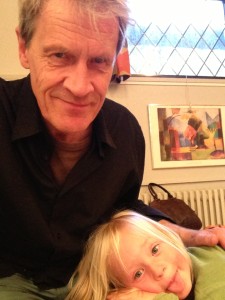One of the earliest memories from my childhood in Stockholm is not about things I did or the outer world I encountered, but about a metaphorical image I associate with my evening prayer — “Gud som haver barnen kär” (God, who holds the children dear]):
Gud som haver barnen kär,
[God who holds the children dear,
se till mig som liten är.
Vart jag mig i världen vänder
står min lycka i Guds händer.
Lyckan kommer, lyckan går,
den Gud älskar, lyckan får.
care for me who is so small.
Wherever I go in the world,
my happiness lies in the hand of God.
Happiness comes, happiness goes
those whom God loves will be happy.]
Every word of this very popular Swedish childrens prayer is forever imprinted in my mind; probably because I seem to have said it every evening, from early childhood up to the age of nine, and maybe even later (“Thomas and I alone at home. He went to bed reasonably early and we read God Who Holds the Children Dear”, wrote my grandfather in his diary in March 1956).
But I don’t have any memories whatsoever of saying the prayer. I don’t remember actually saying the words, or the social situation, or the time and place.
What I do remember, however, when I repeat these words today, is the image that went through my mind 60-65 years ago when I said the prayer.
When I say the penultimate line “Lyckan kommer, lyckan går” (Happiness comes, happiness goes) today, I still remember having the inner image of an iron moving forth and back on an ironing board: Iron comes, iron goes.

(an anonymous German woman)
I probably didn’t understand what the word ‘lycka’ (happiness) meant. But ‘coming’ and ‘going’ were both familiar words; and ironing was an everyday household chore (for the women in our family) in the early 1950s, and was an easily available and appropriate metaphor for how something could ‘come’ and ‘go’.
I guess children often use physical metaphors when trying to conceptualise abstract concepts, when having books read to them, or hearing songs or prayers. But what interests me in this case is the memory aspects — namely, that it is the metaphorical image evoked by saying the prayer that has remained in my mind until this very day, whereas the memory of the actual, situated everynight act of praying seems to be lost in time.


 From my diary, Wednesday 22 July, 1981:
From my diary, Wednesday 22 July, 1981:
